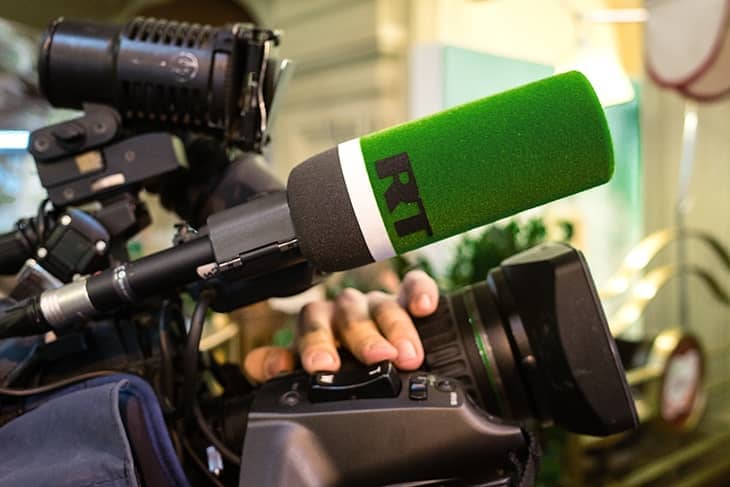It is interesting to watch Ofcom finally remove the broadcasting licence from the Russian propaganda channel Russia Today (RT). I almost managed to do the job myself about 12 years ago.
Back in the 2000s, a number of bad regimes were rushing into the broadcasting space to try to give themselves a better international image. The Chinese Communist party set up a London branch of its state television network called CCTV, apparently unaware of the hilarity this would cause in the English language.
Meanwhile, the Iranian government started PressTV to push the ayatollahs’ views of the world. It set up its propaganda channel from a roundabout on the Hanger Lane gyratory system, proving again that totalitarian regimes are not always brilliant. Guests for its shows were almost always late, stuck in traffic on the A40 and generally turning up, if at all, about halfway through the programme. The mullahs had not planned for this. Anyhow, they lost their broadcasting licence in 2012 after beaming out forced confessions from Iranian jails.

It took until this year to get RT off the networks, but as I say I almost managed it myself. Back then RT had done a huge advertising campaign across the UK, and I was under the impression that this was a relaunch of the Irish channel RTE. After all, this is how PR firms make their millions. As with the Tate and many other overfunded institutions, I assumed that the Irish broadcaster had done the usual thing of going to a firm for PR advice, which had rinsed it for the usual millions and returned with the suggestion that it drop the ‘E’. Like the Tate spending a fortune to lose the ‘the’.
Anyhow, being a media whore at the time, and not the hermit-like figure I have since become, I said yes when I was asked on to what I imagined to be the revamped Irish broadcaster. I was given a time and an address on the Embankment.
I turned up and was surprised to find that the address was a boat, floating on the Thames on a rather dull day. For some reason I had a premonition that something was amiss, but walked the gangway and eventually found another human being setting up a camera. He showed me to my chair and I suddenly realised why we were on a boat. Behind me was a fine view of Westminster. A glorious view, indeed, which might lead the viewer to think that we were on a piece of prime broadcasting real estate, as opposed to a rusty old ship on the Thames.
The host began shouting insults at me. So I started saying ‘Babble’ at him every time he spoke
It turned out that the host was an American, which struck me as odd. It then turned out that the American was going to interview me from Moscow. At this point bells began to sway in the breeze if not quite ring. The host explained that the other guest in Moscow was stuck in the snow, but that we would also be joined by Anne-Elisabeth Moutet in Paris. Excellent, I thought. Anne-Elisabeth is a friend whom I greatly admire, so I settled in for a slightly more normal time.
Nothing prepared either of us for the oddity of the next half-hour. The purpose of the debate turned out to be an effort by our host to attack the French nation for its government’s recent burqa ban. The host in Moscow appeared hellbent on demonstrating that this showed France in the most negative possible light, as totalitarian, illiberal and indeed hypocritical. Neither Anne-Elisabeth nor I gave an inch, but neither could I quite work out why our host was so supremely hostile towards everything about France and everything that his guests were saying. I suppose we started to rub him up the wrong way, because at some point he memorably declared that: ‘The 9/11 hijackers weren’t even fundamentalists.’ I remember my own reaction, which was that my eyes jolted slightly from their sockets. Watching back later I was delighted to see that at the same moment Anne-Elisabeth’s jaw dropped. I began to tell the interviewer what I thought of him. If I remember rightly I ended up telling him that anyone who knew as little as he did shouldn’t be allowed to open his mouth, let alone have his own show.
At which point things started to turn nasty. The host began shouting insults at me. So I started saying ‘Babble’ at him every time he spoke. This did not make him calm down. ‘I want to go over to Paris,’ he said, in order to give himself a break from the man on the Thames shouting ‘babble’ at him. In a moment I shall never forget, when he crossed over to Paris the presenter was greeted by Anne-Elisabeth saying: ‘Piffle. What you are saying is just piffle.’ Things wound to a close shortly after.
I left the boat in a state of some anger, shaking the rust from my feet. By then I had realised that this was a Russia propaganda thing and that the presenter was one of those American journalists who is only known as ‘a famous American journalist’ in Moscow. Years later I learned that this discussion, in RT’s first weeks, almost led to it losing its broadcast licence. Apparently Ofcom thought that the exchange was so wildly biased and unprofessional that the whole channel was almost pulled from the air. If I had only known then what I learned afterwards I would have tried to make things much worse.
Some years later I bumped into some RT employees in a lift in Millbank, where their improved studio attracted such luminaries as Alex Salmond. One of the RT people greeted me and introduced himself. ‘Any chance of getting you back on RT?’ he asked jovially. ‘Not much,’ I replied. ‘Anything we can do that would change that?’ he asked. ‘Don’t be funded by the Kremlin,’ I replied happily. He laughed and we parted ways.
In a way, the fact that RT continued to operate in this country for as long as it did says something about the openness of our society and the tolerance that exists in it and our institutions. But tolerance has its limits, and invading another country while spreading propaganda around the world must be regarded as one such limit.







Comments